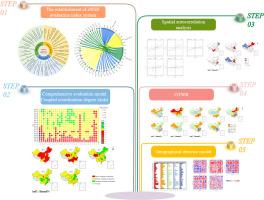中国水-能-粮关系的耦合协调与驱动因素:可持续发展视角
IF 9.5
Q1 ENERGY & FUELS
引用次数: 0
摘要
水、能源和食物(WEF)对人类的生存至关重要,因此研究中国的水、能源和食物关系对可持续发展至关重要。本文提出了综合评价指标体系,运用综合评价模型和CCD模型分析了综合评价水平、耦合协调度(CCD)和时空演化。利用空间自相关模型对中国30个地区的CCD进行了研究。利用地理时空加权模型(GTWR)和地理探测器模型确定了影响世界经济论坛网络CCD的驱动因素。结果表明,世界经济论坛联系协调在全国范围内稳步改善,同时存在显著的地区差异。东部省份的协调水平较高、较早,中部地区的协调速度较快,西部省份仍受资源禀赋的制约。此外,CCD驱动因素表现出明显的时空异质性,研发经费支出、人均可支配收入和GDP增长率在不同省份和不同时期产生不同的影响。在此基础上,提出了加强粮食生产、促进清洁能源开发和优化水资源结构的建议,以加强世界经济论坛在中国各省的联系。本文章由计算机程序翻译,如有差异,请以英文原文为准。

Coupling coordination and driving factors of the water-energy-food nexus in China: A sustainable development perspective
Water, energy, and food (WEF) are crucial for human survival, making studying the WEF nexus in China vital for sustainable development. This work proposes an evaluation indicator system and analyzes the comprehensive evaluation level, coupling coordination degree (CCD), and spatiotemporal evolution using the comprehensive evaluation model and CCD model. A spatial autocorrelation model is used to examine the CCD across 30 regions of China. Additionally, the geographic spatio-temporal weighted model (GTWR) and geographical detector model are used to pinpoint the driving factors affecting the CCD of the WEF nexus. The results reveal a steady improvement in WEF nexus coordination nationwide, accompanied by significant regional disparities. While eastern provinces exhibit higher and earlier coordination levels, central regions show accelerated progress, and western provinces remain constrained by resource endowments. Moreover, the driving factors of CCD demonstrate pronounced spatial–temporal heterogeneity, with expenditure on R&D funding, disposable income per capita, and GDP growth rate exerting varying influences across provinces and over time. Based on these results, recommendations are made to strengthen food production, promote clean energy development, and optimize water resource structures to enhance the WEF nexus across provinces in China.
求助全文
通过发布文献求助,成功后即可免费获取论文全文。
去求助
来源期刊

Energy nexus
Energy (General), Ecological Modelling, Renewable Energy, Sustainability and the Environment, Water Science and Technology, Agricultural and Biological Sciences (General)
CiteScore
7.70
自引率
0.00%
发文量
0
审稿时长
109 days
 求助内容:
求助内容: 应助结果提醒方式:
应助结果提醒方式:


